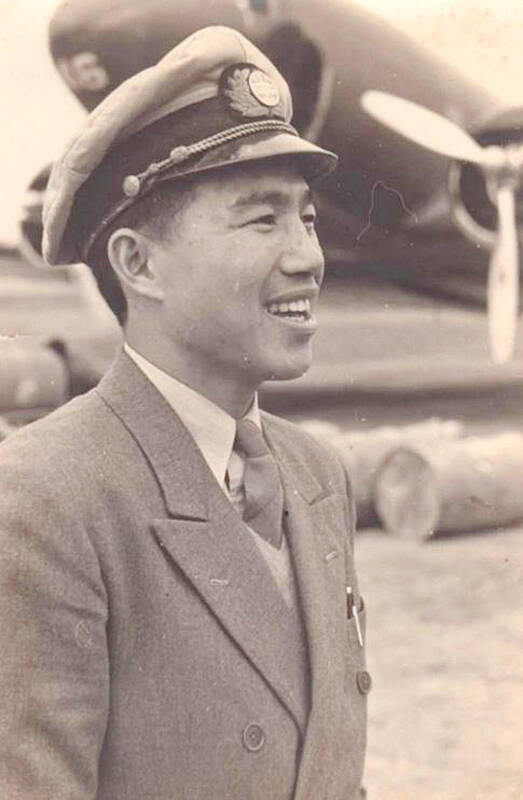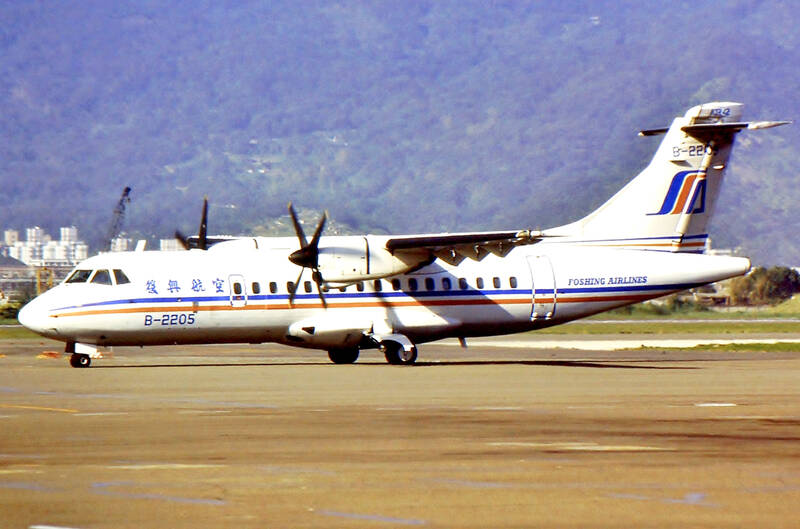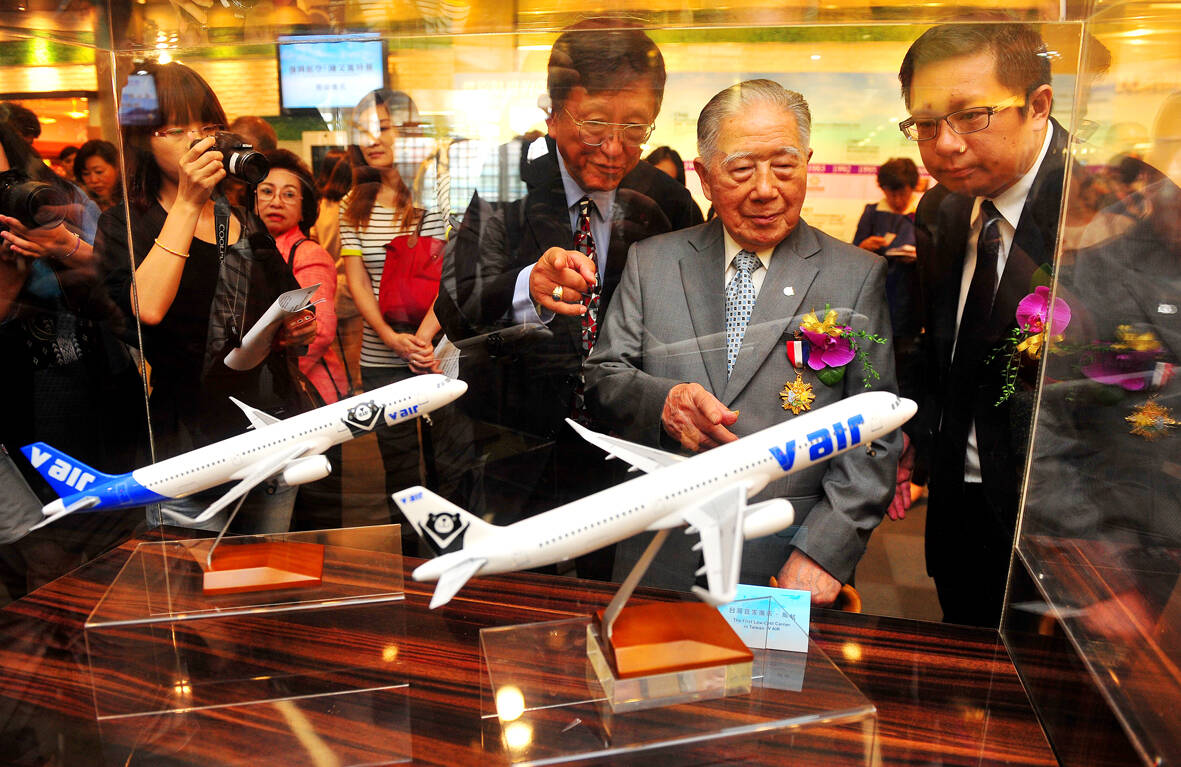May 20 to May 26
The two American HU-16 seaplanes hovered helplessly above the roaring waves, unable to save their seven comrades who had parachuted into the Pacific Ocean after their plane malfunctioned.
As they were discussing the next plan of action over the airwaves, a Taiwanese plane overheard the conversation and told them to contact Chin Moon Fun (陳文寬) — “because that guy can land a plane on any water surface!”

Taipei Times file photo
On March 18, 1954, Chin, who co-owned Foshing Airlines (復興航空, renamed TransAsia in 1992), hurriedly flew one of the company’s two amphibious PBY Catalina planes to the scene. Even though the PBY was inferior to the HU-16, Chin managed to land the plane on the first try by bouncing off a wave. However, a few screws had fallen out due to the impact, and water began seeping in. Instead of aborting the mission, Chin plugged the holes with pencils and continued the rescue effort, which took a total of four hours.
Taking off from the violent seas was much harder. After several tries, Chin asked a US warship that had arrived to break the waves for him, and using the Diaoyutai Islands (釣魚台) to block the wind, the PBY left the waters and flew to safety.
Spanning 50 years from the US to China to Taiwan, Chin’s storied aviation career often saw him at the forefront of historical events. The Republic of China military held his skills in great esteem, and he was asked to transport party leader Chiang Kai-shek (蔣介石) and other government bigwigs on countless occasions.

Photo courtesy of Wikimedia Commons
Although it was Taiwan’s first private civil airline, Foshing Airlines was barely known for its commercial flights under Chin, making most of its revenue through charter missions for the government, as well as ground operations and catering meals for international flights.
Chin sold the company in 1983 at the age of 70, and after making his final flight he relocated to the US where he lived to 110 years old.
DREAMS OF FLYING

Photo: Chien Jung-fong, Taipei Times
Chin was born in 1914 in Guangdong Province. His Chinese-American father returned to the US before his birth, but came back for him 10 years later.
While waiting to pass immigration in Seattle, Chin saw an “odd looking ship with horizontal sails on both sides” in the harbor. He watched it speed up and was shocked when it suddenly took flight. He was mesmerized, writes Wang Li-chen (王立楨) in Chin’s biography.
They made their way to his father’s hometown of Baltimore, where Chin studied to become a car mechanic. Chin saw an ad for an aviation school at a bus stop one day, but his father refused to let him fly, as accidents were frequent in those days. Chin enrolled as a mechanic at the school at first, but his cousin, a respected leader in the Baltimore Chinese community, persuaded his father to let him give it a try.
“If he wants to die so badly, just let him do it,” his father reportedly said, and paid for his tuition — which wasn’t a small sum in those days.
On Aug. 23, 1932, Chin passed his commercial license exam. He long remembered what the examiner told him: “The sky is yours now, go enjoy it!”
CHINA DAYS
Chin returned to China in 1933 as a mechanic and pilot for Pan American Airways’ newly acquired Chinese branch, China National Aviation Corporation.
His first flight as captain was on May 16, 1936, flying from Chongqing to Chengdu. The Japanese invaded Shanghai on Aug. 13, 1937, and Chin helped relocate the company’s planes to Hankou amid enemy fire.
Chin continued to fly throughout World War II, logging more than 10,000 flight hours and helping the ROC military out with numerous operations, including evacuating government officials and other important figures from warzones.
One of Chin’s best known feats was transporting US general Jimmy Doolittle from Chongqing to Calcutta in 1942, just a month after Doolittle led the first US air raid on Japan.
Before arriving at the pit stop in Myitkyina in today’s Myanmar, they heard that Japanese forces were about to capture the town. Chin landed anyway and crammed more than 70 evacuees into the 21-seater. Doolittle tossed everyone’s luggage out of the plane, and Chin climbed over their heads to the cockpit where they made it to India.
After World War II, Chin joined Central Air Transport Co, quickly building up the fleet and turning it into a lucrative business as deputy general manager. As the Chinese Civil War worsened, Chin flew to Taiwan in August 1949 to see if the company could move there. The authorities told him that due to the massive relocation of the ROC Air Force to Taiwan, the only airport available for him was a dilapidated one in Yilan that was practically unusable.
It didn’t matter anyway; as soon as Chin returned to China, Central Air Transport president Chen Cho-lin (陳卓林) informed Chin of his plans to join the Chinese communists in Beijing. Chin turned down multiple requests to go with them, saying that he preferred to observe the situation first before joining any side, retreating to his home in Hong Kong.
MILITARY MISSIONS
Chin spent the following year relaxing and working on his model train hobby. He did not want to join the communists, but Taiwan was not exactly an option either. He pondered returning to the US.
One day, an old buddy who had joined the Chinese Nationalist Party’s (KMT) intelligence agency paid Chin a visit. They wanted him to set up a civilian airline in Taiwan and help the military fly secret missions to China. These planes had to land on the water since the communists controlled most of the coast, and Chen had gained much expertise in this area during World War II.
On May 21, 1951, Chin launched Foshing Airlines with Tai An-kuo (戴安國, former Civil Aviation Administration chief and Chiang Kai-shek’s godson) and former Central Air Transport colleague Tsai Ke-fei (蔡克非).
The airline struggled to attract commercial customers, with only its Taipei-Hualien route seeing significant ridership. The military contracted Foshing’s two PBY planes to transport officers to the islands the Chinese Nationalist Party (KMT) still held along the coast, of which only Kinmen had an airport. They supplemented the income by handling ground operations for Thai Airways.
Foshing’s first military mission was to take a major general to the Dachen Islands, and Chin personally flew as captain. It was already tricky to land the plane in the reef-filled waters, and it suffered a major malfunction on the way back. Chin managed to pull through, greatly impressing the officer. In the ensuing years, they flew charter operations almost daily for the military.
The government decided to evacuate the Dachens in early 1955 as the People’s Liberation Army closed in. Chin’s job was to fly top officials, including Chiang Ching-kuo (蔣經國) and defense minister Yu Ta-wei (俞大維), to supervise the operation.
In 1952, Foshing was contracted to deliver weapons and supplies to the KMT’s “lost army” in Myanmar. Chin led the first journey before handing it over to his staff. They made 30 trips before the KMT was forced to cancel the missions due to Myanmar complaining to the UN about their presence.
Chin also flew several missions to Indonesia in 1958 to support the US-backed coup against then-president Sukarno.
LATER YEARS
Foshing took a huge hit after the disappearance of one of its PBYs in October 1958 en route from Matsu to Taipei. The airline was still barely making any money from its domestic flights, and this loss led it to suspend all regular flight operations.
Prior to 1966, all in-flight meals in Taiwan were prepared by the Grand Hotel, delivered by car to Songshan Airport in wooden bento boxes. Longtime partner Thai Airways hoped to have a professional “air kitchen” closer to the airport that prepared meals according to modern airline standards, and asked if Foshing wanted to do the job.
This venture actually became Foshing’s main income source, with its lone PC-6 plane making occasional charter flights for foreign tourists to Sun Moon Lake and Lishan (梨山).
In 1983, Chin, Tai and Tsai sold the majority share of the company to the Goldsun Group. A 70-year-old Chin made his final flight that year, delivering the PC-6 to Korean Air in Seoul.
Chin then moved back to the US, where he died last May at the age of 110.
Taiwan in Time, a column about Taiwan’s history that is published every Sunday, spotlights important or interesting events around the nation that either have anniversaries this week or are tied to current events.

Jacques Poissant’s suffering stopped the day he asked his daughter if it would be “cowardly to ask to be helped to die.” The retired Canadian insurance adviser was 93, and “was wasting away” after a long battle with prostate cancer. “He no longer had any zest for life,” Josee Poissant said. Last year her mother made the same choice at 96 when she realized she would not be getting out of hospital. She died surrounded by her children and their partners listening to the music she loved. “She was at peace. She sang until she went to sleep.” Josee Poissant remembers it as a beautiful

For many centuries from the medieval to the early modern era, the island port of Hirado on the northwestern tip of Kyushu in Japan was the epicenter of piracy in East Asia. From bases in Hirado the notorious wokou (倭寇) terrorized Korea and China. They raided coastal towns, carrying off people into slavery and looting everything from grain to porcelain to bells in Buddhist temples. Kyushu itself operated a thriving trade with China in sulfur, a necessary ingredient of the gunpowder that powered militaries from Europe to Japan. Over time Hirado developed into a full service stop for pirates. Booty could

Before the last section of the round-the-island railway was electrified, one old blue train still chugged back and forth between Pingtung County’s Fangliao (枋寮) and Taitung (台東) stations once a day. It was so slow, was so hot (it had no air conditioning) and covered such a short distance, that the low fare still failed to attract many riders. This relic of the past was finally retired when the South Link Line was fully electrified on Dec. 23, 2020. A wave of nostalgia surrounded the termination of the Ordinary Train service, as these train carriages had been in use for decades

Lori Sepich smoked for years and sometimes skipped taking her blood pressure medicine. But she never thought she’d have a heart attack. The possibility “just wasn’t registering with me,” said the 64-year-old from Memphis, Tennessee, who suffered two of them 13 years apart. She’s far from alone. More than 60 million women in the US live with cardiovascular disease, which includes heart disease as well as stroke, heart failure and atrial fibrillation. And despite the myth that heart attacks mostly strike men, women are vulnerable too. Overall in the US, 1 in 5 women dies of cardiovascular disease each year, 37,000 of them